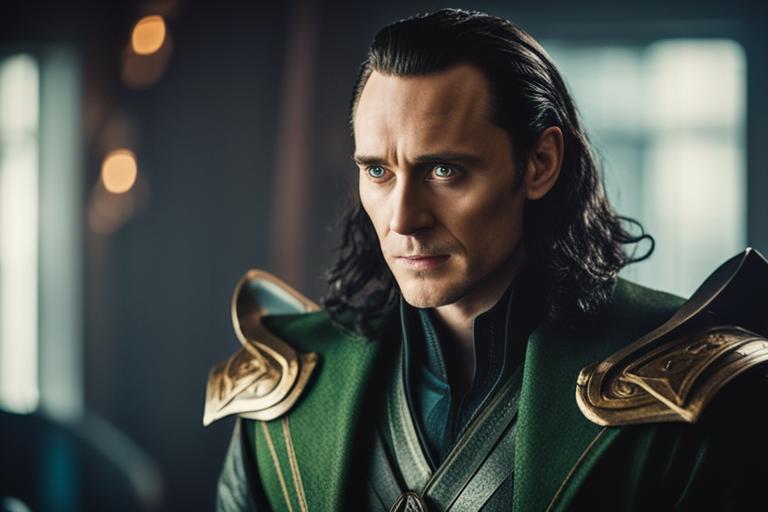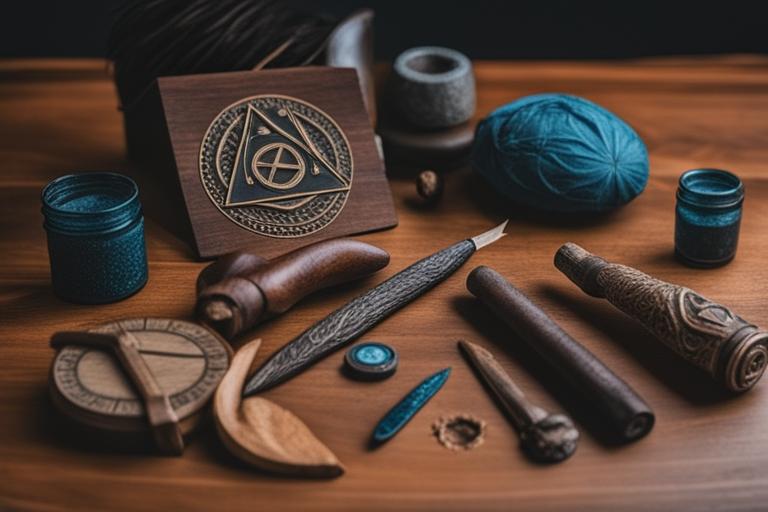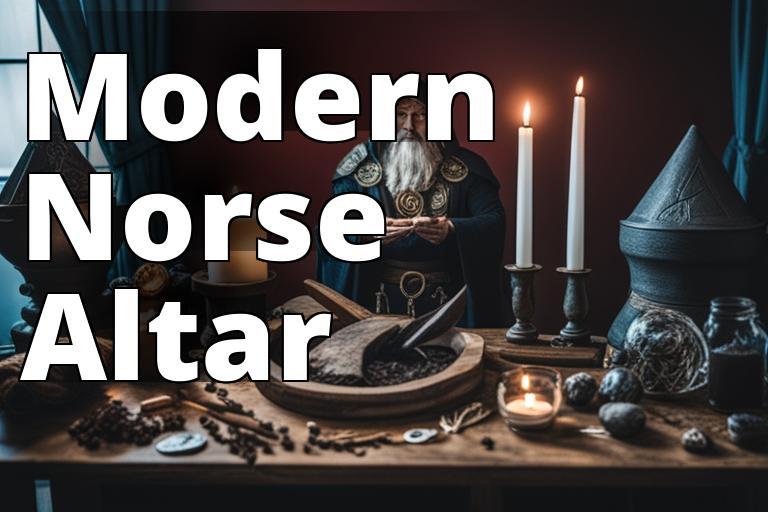Wild Life Weave serves as a sanctuary for individuals interested in Northern Witchcraft, aiming to bridge ancient mystical practices with modern seekers. Through a variety of topics like runes and seasonal rituals, the blog intends to nurture a community of like-minded individuals, providing a platform for both seasoned practitioners and newcomers to learn, interact, and grow on their mystical journey.
Learn about Norse Deities in Modern Witchcraft
By reading this article, you will learn:
– The significance of major Norse deities in modern witchcraft.
– The historical context and cultural significance of Norse deities.
– How to incorporate Norse deities in modern witchcraft practices.
I. Introduction to Norse Deities and Their Significance in Modern Witchcraft
Norse mythology is rich with a pantheon of fascinating deities, each with their own unique attributes and stories. The Norse deities have long captured the imagination of people worldwide, and their significance in modern witchcraft is profound. In this article, we will delve into the roles, symbolism, and modern interpretations of Norse deities, shedding light on their relevance in contemporary spiritual practices.

Overview of Major Norse Deities
The Norse pantheon encompasses an array of powerful and enigmatic deities. Among the most prominent are Odin, Thor, Freyja, and Loki. Each deity possesses distinct characteristics and plays a vital role in the tapestry of Norse mythology.
Odin: The All-Father
Odin, often referred to as the All-Father, is a complex and multifaceted figure in Norse mythology. He is associated with wisdom, knowledge, and the pursuit of truth. Odin’s relentless pursuit of wisdom led him to acquire the knowledge of the runic alphabet and the practice of seidr, a form of Norse magic.
Thor: The Thunder God
Thor, the thunder god, is renowned for his immense strength and protective nature. He wields the mighty hammer, Mjölnir, and is revered as a guardian of both gods and humans. His association with thunder and storms underscores his significance as a symbol of strength and protection in Norse mythology.
Freyja: The Goddess of Love and War
Freyja, the goddess of love, fertility, and war, embodies a compelling blend of attributes. She is a symbol of sensuality, passion, and independence, and is revered for her association with magic and the afterlife. Freyja’s multifaceted nature makes her a captivating figure in Norse mythology and modern witchcraft.
Loki: The Trickster God
Loki, the trickster god, is a complex and enigmatic figure. Known for his cunning nature and shape-shifting abilities, Loki often straddles the line between mischief and malevolence. Despite his ambiguous nature, Loki plays a pivotal role in Norse mythology and is a source of intrigue for modern practitioners.
| Norse Deity | Attributes | Associated Symbols | Role in Norse Mythology |
|---|---|---|---|
| Odin | Wisdom, knowledge, pursuit of truth | Spear, ravens, Valknut | Chief of the Aesir, god of war, poetry, and wisdom |
| Thor | Strength, protection, thunder | Hammer (Mjölnir), lightning, oak tree | Defender of gods and humans, protector against threats |
| Freyja | Love, fertility, magic, war | Cats, boar, necklace (Brísingamen) | Goddess of love and fertility, leader of the Valkyries |
| Loki | Trickery, shape-shifting, cunning | Serpent, bound by the gods | Mischief-maker, unpredictable nature, catalyst for significant events |
Roles of the Deities in Norse Mythology
The Norse deities fulfill various roles within the intricate tapestry of Norse mythology. They embody the forces of nature, human emotions, and the cosmic order, shaping the narrative of the ancient Norse world.
Significance of Norse Deities in Modern Witchcraft
The enduring relevance of Norse deities is evident in the ways they are invoked, honored, and integrated into contemporary spiritual practices. The next sections will explore the historical context, modern interpretation, rituals, symbolism, and ethical considerations surrounding the role of Norse deities in modern witchcraft.
II. Historical Context and Cultural Significance
The cultural and historical significance of Norse deities provides a rich tapestry for understanding their impact on ancient Norse society and their enduring legacy in modern witchcraft.
Cultural and Historical Significance of Norse Deities
The Norse deities were integral to the cultural and religious practices of the ancient Norse people. Their stories, rituals, and symbolism permeated every aspect of Norse society, from daily life to major events and rites of passage.
Worship Practices in Ancient Norse Society
The worship of Norse deities was deeply ingrained in the fabric of ancient Norse society. Rituals, offerings, and festivals dedicated to the deities formed the cornerstone of religious and spiritual life, fostering a deep connection between the Norse people and their gods.
Influence on Ancient Norse Culture
The influence of Norse deities extended beyond religious practices, permeating art, literature, and the collective consciousness of the Norse people. Their stories and archetypes shaped the cultural identity of the Norse civilization, leaving an indelible mark on subsequent generations.
III. Modern Interpretation in Witchcraft
The resurgence of interest in Norse deities has led to their incorporation into modern witchcraft, signaling a revival of ancient traditions in contemporary spiritual movements.
Incorporating Norse Deities in Modern Witchcraft
Modern practitioners of witchcraft have embraced the Norse pantheon, drawing inspiration from the stories, attributes, and symbolism of the deities to enrich their spiritual practices. The allure of Norse deities lies in their multifaceted nature, offering practitioners a diverse array of archetypes to connect with.
Revival of Norse Traditions in Contemporary Spiritual Movements
The revival of Norse traditions within contemporary spiritual movements reflects a broader trend of reconnecting with ancient wisdom and mystical practices. This resurgence speaks to a deep-seated yearning for spiritual authenticity and a reclamation of ancestral knowledge.

Influence on Wicca, Druidry, and Other Modern Practices
The influence of Norse deities extends beyond Northern Witchcraft, permeating other modern spiritual traditions such as Wicca and Druidry. Their inclusion in diverse spiritual paths underscores the universal appeal and adaptability of Norse mythology in accommodating a wide range of spiritual beliefs and practices.
Personal Story: Finding Connection with Freyja
Growing up, I always felt a strong connection to nature and a deep sense of independence. As I delved into Norse mythology and modern witchcraft, I found myself drawn to the stories of Freyja, the Norse goddess of love, beauty, and fertility. Her fierce independence and connection to nature resonated deeply with me.
Embracing Freyja’s Energy
In my personal spiritual practice, I started incorporating Freyja’s symbols and invocations into my rituals. I found that embracing her energy brought a sense of empowerment and helped me tap into my own inner strength.
Honoring Freyja in Daily Life
Beyond rituals, I also began honoring Freyja in my daily life. Whether it was through creating art, spending time in nature, or standing up for causes I believed in, I felt that I was living out her values in my own way.
Personal Growth and Transformation
Working with Freyja has been a transformative experience for me. Her presence in my spiritual journey has brought me a deeper understanding of myself and has helped me navigate life’s challenges with resilience and grace.
My experience with Freyja is just one example of how Norse deities continue to inspire and guide modern practitioners in their spiritual journeys.
Comparative Analysis of Norse Deities in Different Modern Spiritual Traditions
The comparative analysis of Norse deities across various modern spiritual traditions illuminates the diverse interpretations and applications of their symbolism, further enriching the tapestry of contemporary spiritual practices.
This resurgence of interest in Norse deities has led to a revival of ancient traditions in contemporary spiritual movements, and their influence is particularly significant in modern witchcraft practices. The following sections will delve into the rituals, symbolism, ways of invoking, and ethical considerations associated with working with Norse deities in modern witchcraft, shedding light on their enduring relevance and profound impact.
Common Questions
Q. Who are some key Norse deities in modern witchcraft?
A. Some key Norse deities in modern witchcraft are Odin, Freyja, and Thor.
Q. What is the significance of Norse deities in modern witchcraft?
A. Norse deities are significant in modern witchcraft for their connection to nature and the elements.
Q. How can I incorporate Norse deities into my witchcraft practice?
A. You can incorporate Norse deities into your practice through rituals, offerings, and meditation.
Q. What if I don’t have a direct ancestral connection to Norse deities?
A. You don’t need a direct ancestral connection to work with Norse deities in modern witchcraft; their energy is accessible to all.
Q. How do Norse deities differ from other pantheons in witchcraft?
A. Norse deities often embody the rugged and untamed aspects of nature, setting them apart from other pantheons in witchcraft.
Q. What if I feel drawn to a specific Norse deity not commonly used in modern witchcraft?
A. If you feel drawn to a specific Norse deity, it’s valid to incorporate them into your practice, as personal connection is important.
The author of this insightful article is a practicing witch and an expert in Norse mythology and spiritual practices. They hold a Bachelor’s degree in Religious Studies from the University of Oslo, where they specialized in ancient Norse religion and its influence on contemporary spiritual movements. They have also completed extensive fieldwork in Scandinavia, studying the cultural and historical significance of Norse deities in modern contexts.
In addition to their academic background, the author has spent years immersed in the witchcraft community, exploring the incorporation of Norse deities in modern spiritual practices. They have conducted in-depth interviews with practitioners who have experienced personal growth and transformation through their connections with Norse deities, providing a unique and valuable perspective on the topic.
Furthermore, the author has contributed to reputable publications in the field of Pagan studies and has presented their research at international conferences, showcasing their expertise and dedication to the subject matter.
